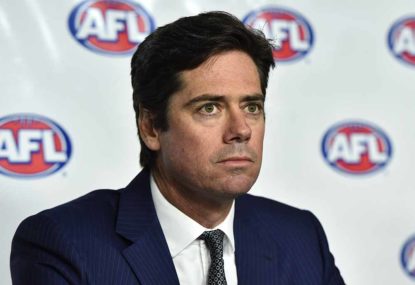Richmond’s grand final victory capped another remarkably successful year for the AFL, with match attendances and television ratings up, and the hugely successful launch of the AFL women’s competition in February among major highlights.
2017 has also been a landmark year for the code for other reasons.
CEO Gillon McLachlan has steered the AFL down a path to where the organisation is not only Australia’s dominant sporting code, but also a community leader, influencer and opinion shaper on a number of social issues, including multiculturalism, indigenous rights, violence, gender equality, same-sex marriage, workplace diversity and women’s rights.
The seeds of what many have described as McLachlan’s ‘moral crusade’ were sewn in the criticism the sport received over many decades, where an entrenched culture largely reflected the commonly accepted ‘blokiness’ of football; the final gasping breaths of which we now see being played out by the Nine Network’s increasingly isolated Sam Newman.
It is not just Newman who is unhappy.
Many fans are angry that the AFL seems to focus less on how a player can be cleared to play in a grand final after hitting an opponent in the head with his shoulder, and more on garnering ‘feel good’ headlines from influencing people to vote ‘yes’ for same-sex marriage.
With respect to women, it is the cumulative effect of high-profile incidents over the years including:
Sexual assault allegations against St Kilda’s Steven Milne (rape charges against Milne were dropped in 2014 when he pleaded guilty to indecent assault)
High-profile player agent Ricky Nixon’s sordid involvement with a so-called ‘St Kilda Schoolgirl’Champion player Wayne Carey pleading guilty to indecent assault after grabbing the breasts of a woman in publicRichmond’s Dustin Martin allegedly threatening a woman at a Windsor restaurant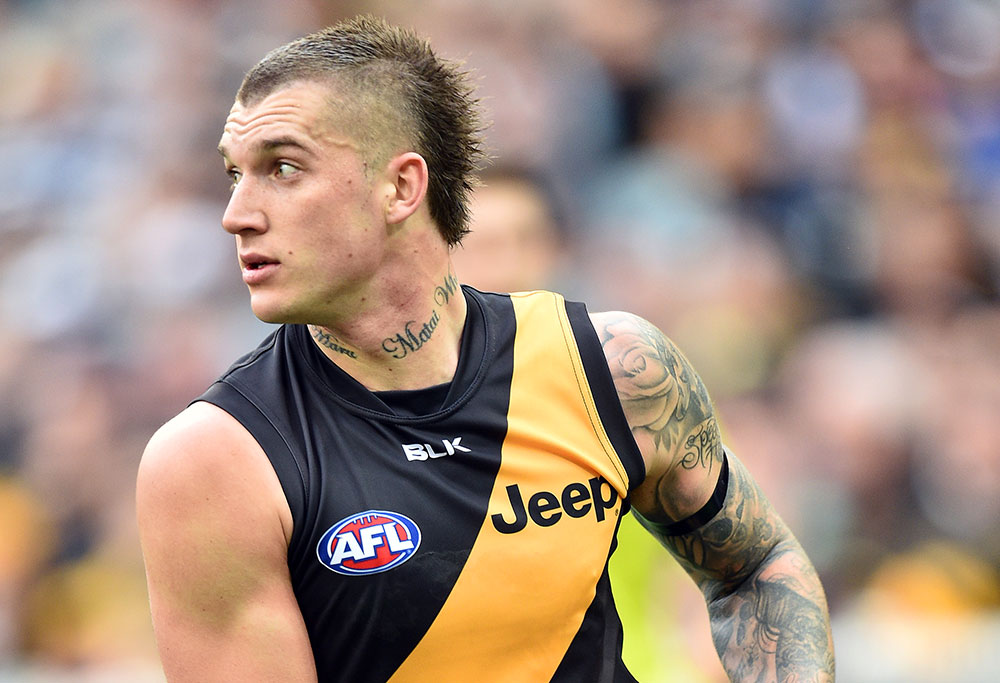
Dustin Martin (AAP Image/Julian Smith)
These were the most talked about incidents and in a sense forced the hand of the AFL’s leadership, and no reasonable person could deny that a culture change was both necessary and welcome.
Further, the notion that a high-profile, national women’s competition could be launched by an organisation that continued to fail to adequately address issues around the representation and treatment of women in and around the sport was unthinkable, hence McLachlan’s visibility in leading this change from the front, and the justifiable praise for him facilitating this.
But there is one increasingly large elephant in the AFL Women’s room that, if not addressed soon by McLachlan, leaves him and his organisation open to accusations of gross hypocrisy and selective morality.
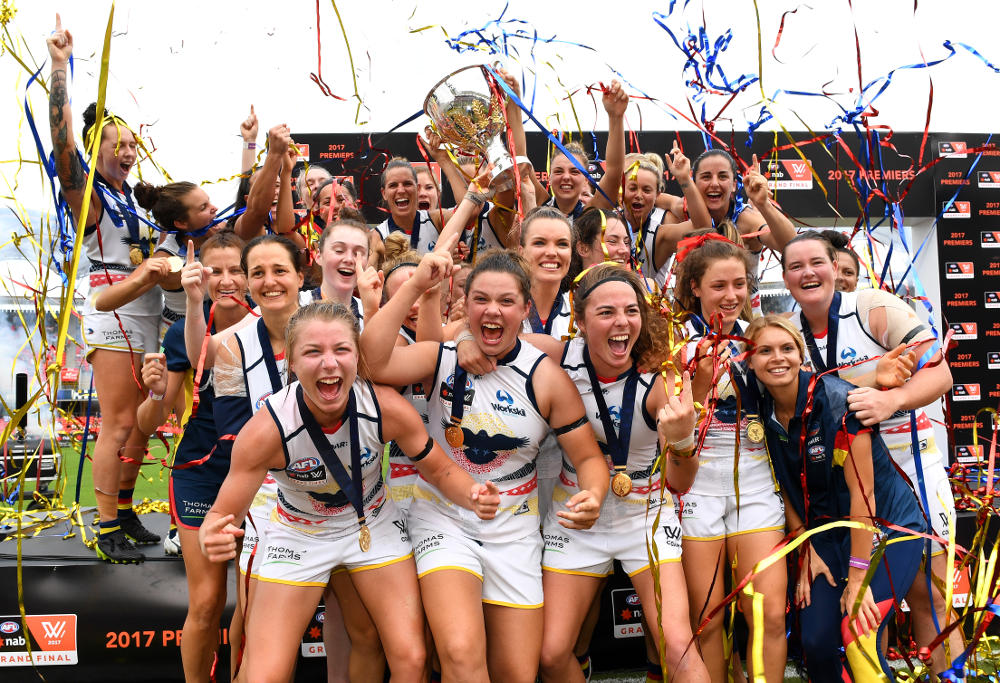
(AAP Image/Dan Peled)
Recently, the ABC’s 7.30 Report aired a story of the sacking of Seven Network reporter Amy Taeuber, which came after Taeuber laid a complaint of harassment against a male senior staff member.
The audio that accompanied the report provided an eye-popping insight into an organisation, Seven West Media, that, when faced with the choice of maintaining an entrenched male-dominated workplace culture and protecting its own reputation, or providing a young female cadet with procedural fairness and natural justice, appeared to choose the path of self-interest.
Taken in isolation, Taueber’s fate might perhaps be just another in a long line of whistleblower stories, where nothing good comes of it for the individual who dares step out of line and challenge authority.
But Seven West Media has a history of allegations in regards to the treatment of women, most notably through the behaviour of CEO Tim Worner, whose affair with employee Amber Harrison was exposed in December of last year.
Harrison chose to keep the matter in the public arena and was subsequently crushed by Seven West Media’s legal team in the courts.
Worner was also accused of similar affairs with no less than four other female employees, but in February this year was formally cleared by the Seven West Media board of improper conduct and retained his position at the head of the organisation.
Notably, the day before this announcement, board member Sheila McGregor, one of only two female board members, resigned, citing ‘ethical concerns.’
So why should the actions of Worner and Seven West Media be any concern of the AFL?
In August 2015 the AFL announced a new broadcasting rights agreement totaling $2.5b over six years.
McLachlan taking a seat at the press conference table alongside Seven West Media chairman Kerry Stokes.
Seven’s share of the agreement was said to be worth $900m to the AFL.
In July this year, senior AFL officials Simon Lethlean and Richard Simkiss were forced to resign after reports emerged that they had conducted workplace affairs with female employees.
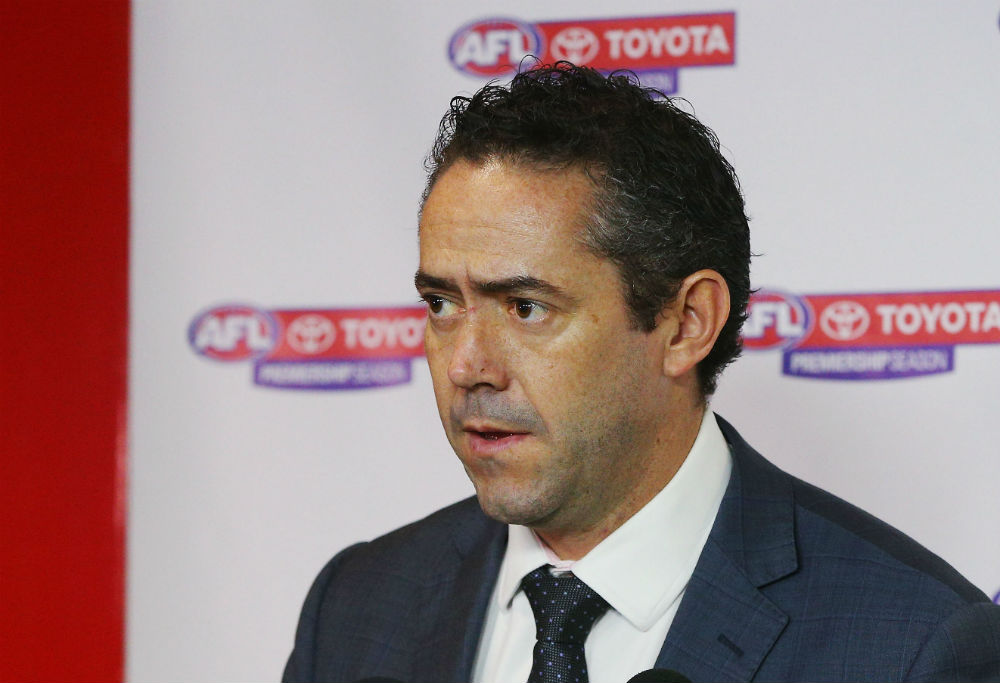
Simon Lethlean (Photo by Michael Dodge/Getty Images)
While debate raged about the rights and wrongs of McLachlan and the AFL prying too intently into people’s bedrooms, workplace lawyer and Director of Australian Business Lawyers and Advisors, Joe Murphy identified that the issue for the AFL was “not that the executives were married men having an affair, but that their conduct was impacting on the organisation’s reputation” through rumours in the media.
Social and traditional media reaction to Seven West Media and the contrast in its treatment of Worner and Taueber has been scathing. Despite defending its treatment of Taueber – as it is entitled to do – the organisation has suffered, and continues to suffer, considerable reputational damage.
So far, little of that fallout has extended to the AFL.
What has, has largely been contained to Sydney where, in April of this year, Worner resigned from the board of the Sydney Swans, after pressure was applied by female board members, unhappy with their association.
In July, in the wake of the resignation (sacking) of Lethlean and Simkiss, Chairman of the AFL Commission, Richard Goyder, said “we have our own standards and we will live by our own standards.”
What has since become clear is that those standards are ones that are to be applied selectively, according to how expendable (Lethlean and Simkiss), or valuable (Worner and Seven West Media) might be to the AFL.
It is argued by some that the AFL has no influence, and should have no influence over an outside organisation like Seven West Media.
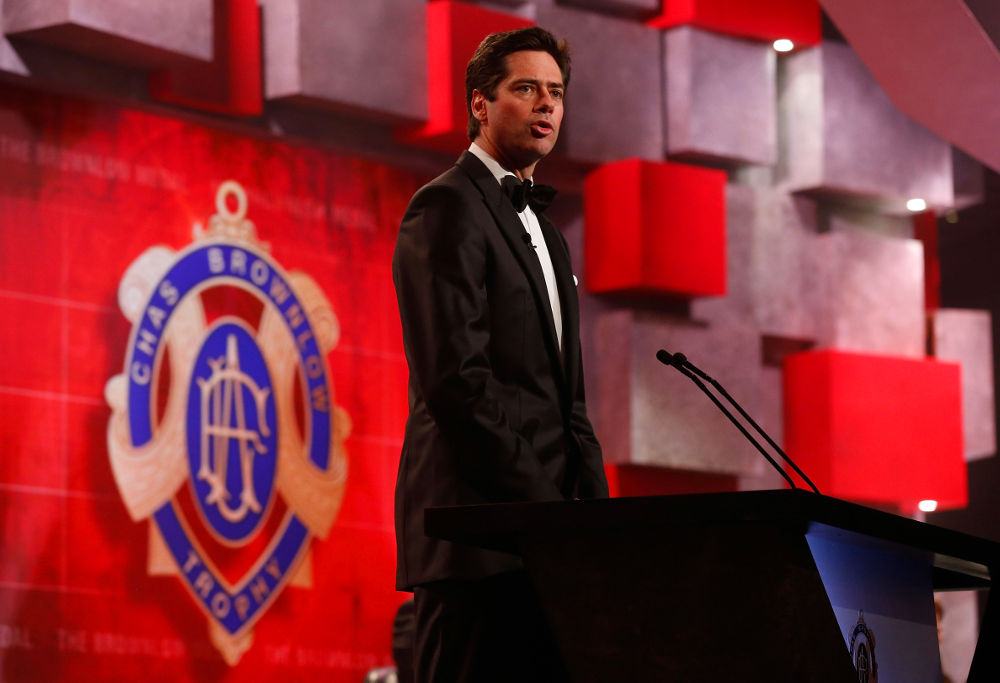
(Photo by Michael Willson/AFL Media/Getty Images)
A view that is incongruous with the AFL influencing all and sundry on any number of matters outside of football.
When it suits, the AFL is eager to tell everyone what they should think and feel on social issues.
Everyone that is except Seven.
There are any number of precedents in AFL football of clubs and sponsors terminating arrangements because their respective values no longer aligned.
For example in 2012 the Melbourne Demons terminated a $2m per year sponsorship deal with ‘Energy Watch’ after its CEO Ben Polis made racist and sexist remarks on social media.
It works in reverse too.
In 2005 the TAC terminated its sponsorship of the Richmond Tigers after player Jay Schulz was busted for drink-driving and speeding.
In 2016 Nissan terminated a major sponsorship arrangement with the Nine Network, citing “comments made by Sam Newman that were broadcast on ‘The Footy Show’ last week do not align with Nissan’s brand values.”
What the Demons, the TAC and Nissan have in common is that, with respect to matching values with actions, they walked the walk.
The AFL meanwhile talk the best game in town, but are selective when it comes to backing it up with action.
Seven West Media’s Worner is reportedly a personal friend of Gillon McLachlan.
It is not known what McLachlan thinks about the names of racehorses that have reportedly been owned or part-owned by Worner; including ‘Chicks Dig Me’, Centrefold Spread’ and ‘Legs Akimbo.’
Moral crusading and social justice advocacy can be sickly enough even when it is undertaken genuinely. But when it is applied selectively, sickly soon begins to taste sour.
To those who say that no organisation is going to turn their back on a $900m business partnership just because of the way that business partner handles a case of bullying, and maintain that it is not a matter for them to become involved, I say that is exactly the point.
The problem with moral crusades is that they are absolute. All in.
If the AFL is genuine about leading society in attitudes to women in general, and their participation in sport then, at the very least, they should withdraw the right from Seven to broadcast next year’s AFL Women’s competition.
A privilege Seven currently pays nothing for.
If they don’t, then what McLachlan has previously described as the AFL’s “cultural journey” is exposed as nothing more than a $900m charade.





























































































